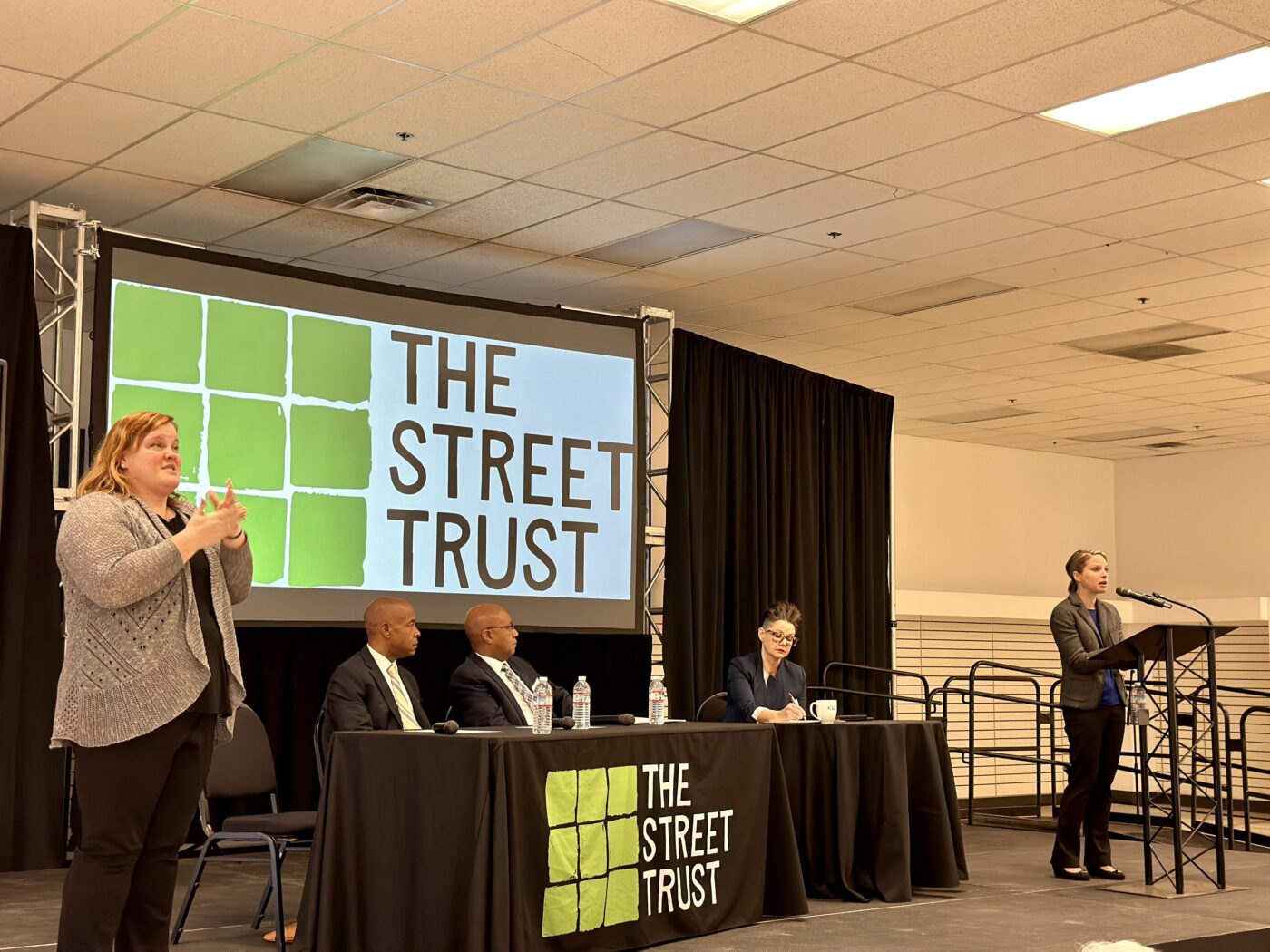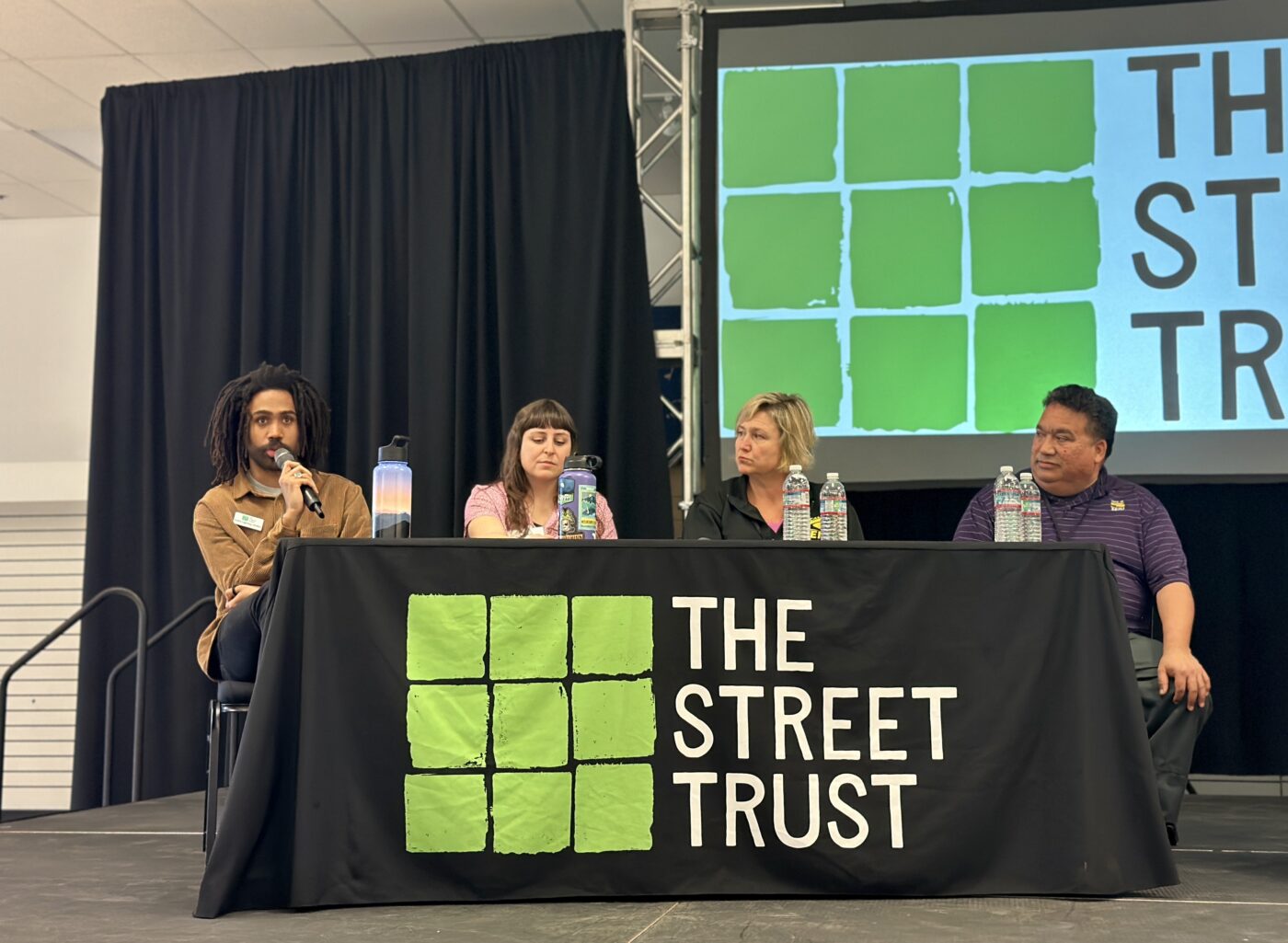 (From left, seated: Desue, Jr., Auten, Iannarone, Breault)
(From left, seated: Desue, Jr., Auten, Iannarone, Breault) (Lightsey-Walker, Roth, Niemi, Quintero)The two panels. (Photos: Taylor Griggs/BikePortland)
(Lightsey-Walker, Roth, Niemi, Quintero)The two panels. (Photos: Taylor Griggs/BikePortland)Most Portlanders are probably familiar with some of the issues regional public transit agency TriMet has been dealing with lately: ridership declines, dire operator shortages, public safety concerns and budget issues — all of which agency leaders hope to solve with a controversial fare hike. Turns out, other transit services across the state (and beyond) are facing similar challenges.
On Monday at the 2023 Oregon Active Transportation Summit (hosted by The Street Trust at Lloyd Center Mall) attendees heard from both transit agency leaders who manage systems from a high level, and the community advocates who see how people experience these services. Both perspectives are important for understanding the current state of public transit and where it will go from here.
Executive Director of The Street Trust (TST) Sarah Iannarone served as the moderator for the first panel of transit agency leaders. She said TST has been “thinking multimodal for quite some time now” (moving beyond its former name of Bicycle Transportation Alliance) and they wanted to hold a conversation about Oregon’s evolving public transit systems.
“Transit is in a dynamic state right now. It needs our support,” Iannarone said.
The first panel consisted of three transit agency leaders from across Oregon: Sam Desue, Jr., who leads TriMet; Lane Transit District (LTD) General Manager Jameson T. Auten; and Andrea Breault from Cascades East Transit in central Oregon. Each provided a different perspective on what it’s like to run a transit agency in their distinct part of the state.
Following their panel conversation, we heard from a group of four transportation advocates: The Street Trust Planning and Policy Manager André Lightsey-Walker; Better Eugene-Springfield Transportation (BEST) Program Manager Claire Roth; and SEUI Local 49′s Meg Niemi and Renato Quintero. Moderated by Josh Laurente from OPAL Environmental Justice Oregon, these four people brought unique insights on a range of subjects, and it was especially interesting to hear their thoughts in relation to what the agency leaders had to say.
The pandemic’s impact
“I was afraid to ride transit from a Covid perspective. That pushed me, a daily transit commuter, away from using our transit system.”
Many of the problems currently impacting public transit agencies were present even before the pandemic hit a little more than three years ago. But Covid certainly exacerbated these issues, forcing agency leaders to rethink their operations and make some big changes.
“Everything changed during the pandemic for TriMet,” Desue, Jr. said. “One thing that was vital to us was making sure that transit continued to roll to get our emergency workers and our transit-dependent personnel to appointments and services.”
Because of the shift to remote work during the pandemic, peak ridership hours evolved. TriMet had to figure out their riders’ new schedules and has recently moved to accommodate those changes.
But it wasn’t just remote work that kept people off of public transit during the pandemic. Many former passengers — and operators — were now afraid of being in an enclosed box with strangers who could infect them with a deadly virus. While this fear is understandable, some transit advocates think it was harmful to spread the message that being on a bus was any more dangerous than being anywhere else in public, and some riders may never return to the public transportation system because of it.
During their discussion, advocates talked about how the pandemic impacted their own ridership and what they saw from others.
“I was afraid to ride transit from a Covid perspective,” Lightsey-Walker said. “That actually pushed me, a daily transit commuter, away from using our transit system.” Lightsey-Walker said he switched to using Biketown instead, which he felt was a safer option in the midst of the pandemic. (Considering Biketown’s success in the last couple of years, it looks like lots of people agreed with him.)
Auten said that LTD has begun working with local bike and scooter share programs in Eugene and Springfield to accommodate this shift toward other modes of transit.
“We’re starting to figure out how all these pieces connect,” he said.
Public safety
Public safety is a very hot topic within the transit conversation, but the discussion is often narrowly focused on only one idea of what public safety is. In Portland, people often mention the prevalence of people on public transit who may be experiencing mental health crises or even using drugs on the MAX. These concerns are real, but there are other public safety problems related to transit that are often neglected.
“Safety is subjective and the things that make people feel unsafe are different,” Lightsey-Walker said during the community advocate panel.
Lightsey-Walker recounted the story of when he felt most at risk while using public transit.
“If you didn’t realize, I’m a young Black man in Portland, Oregon. So you may have an idea of where safety concerns actually emerge for me,” he said. “The most scared I’ve ever been in a transit situation was actually being followed by an officer…having an encounter with a individual who has the ability to shoot me on site is a pretty jarring experience and, and certainly more scary than any situation I’ve ever experienced riding the bus with someone have a mental health issue.”
In the past few years, TriMet has started a program to move toward an approach to security based in conflict resolution instead of retribution. Some armed officers have been replaced with people trained in mediation and crisis management. But this isn’t the only safety concern keeping people away from riding transit.
Meg Niemi is a union rep and a safe streets advocate in Portland. She said she thinks public safety on transit encompasses many different things, including the ability for people to walk to the bus stop without the threat of traffic violence and to be able to get on their bus or train quickly so they don’t have to wait a long time in dark, isolated areas.
Niemi said two members of SEIU Local 49 have been killed in traffic crashes while trying to get to the bus.
“I think the issue of safety is is multifaceted… there are a lot of issues that need to be addressed around safety to make all of us feel safer using public transit and other modes of of transportation besides cars,” Niemi said. “We have to work together to make it so people are who are walking and biking feel safe getting to and from transit.”
There have been some incidents in the past few years where TriMet bus drivers were assaulted by passengers. These occurrences — and TriMet’s apparent lackluster response to them — are a reason some employees said there was a staffing shortage within the agency.
But TriMet has made changes to protect their operators, installing glass shields on buses to protect bus drivers from assault and changing their rules on long-term exclusions for passengers who commit misdemeanors while riding TriMet. Evidently, these measures have been effective, because TriMet has largely been able to overcome its staffing woes.
The future for public transit
“The freedom to choose mobility options belongs to the people and transportation is a human right. The privileged vocal opposition can’t take that away from us.”
What do transit leaders and advocates expect — or want — the future of public transit to look like?
Auten brought up a point that is often overlooked in conversations about public transit — that maybe ridership data isn’t everything.
“Ridership is an important indicator, don’t get me wrong, but it’s not the only one,” Auten said. He said he wants to direct LTD to look at other outcomes as well, like whether or not people are able to get where they need to go on public transit. “I think it’s important for us to… understand how our public is using us and how we need to change and make sure that we have real mobility options.”
During the second panel, BEST’s Claire Roth added to this point.
“Opposition claims that empty buses mean that people are not riding transit. We know that that’s not true, or else I would use the same argument when I see empty streets and I would say ‘Well, people aren’t driving cars,'” Roth said. “The freedom to choose mobility options belongs to the people and transportation is a human right. The privileged vocal opposition can’t take that away from us.”
Roth is familiar with this vocal opposition to bus service — she and other local advocates have been fighting back against a group of people who were so upset about a proposed bus rapid transit project in Eugene that they led a successful campaign to oust a pro-transit city councilor. To Auten, this was a learning experience about public engagement strategy.
“We have to assess how people are receiving information now. How are we gathering that information and turning that into decision-making and then communicating what comes out of that?” Auten said. “As we [study our engagement strategy], I think we’ll learn that what our public really needs us to be, not what we want to be.”
Auten said serving such an engaged community can be a double-edged sword, but it’s better than the alternative of being part of a community that’s indifferent to change.
“I like to joke that I can’t order a ham sandwich without going to five different councils or committees…but the opposite [would be] worse,” he said. “We have an engaged community that we’re going to work with.”
And even if public transit isn’t your primary focus when it comes to transportation advocacy, Roth said a well-functioning public transit system is crucial to the entire transportation ecosystem.
“If we see a transit system that’s working well that means we should also see pedestrian and bicycle networks working well,” Roth said. “Transit doesn’t just serve people who take transit. It serves everyone. And honestly, transportation is a human right.”

Taylor has been BikePortland’s staff writer since November 2021. She has also written for Street Roots and Eugene Weekly. Contact her at This email address is being protected from spambots. You need JavaScript enabled to view it.

